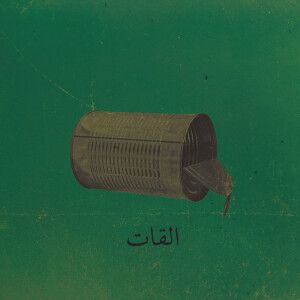 El Khat’s Albat Alawi Op. 99 is nothing if not exhilarating. Eyal el Wahab’s passionate and cryptic Arabic lyrics, set to polyrhythmic music that is alternately minimalist and maximalist, is one of the most intriguing releases of 2022 so far.
El Khat’s Albat Alawi Op. 99 is nothing if not exhilarating. Eyal el Wahab’s passionate and cryptic Arabic lyrics, set to polyrhythmic music that is alternately minimalist and maximalist, is one of the most intriguing releases of 2022 so far.
This is the second album by El Khat, the ensemble led by Eyal el Wahab, a member of the Yemeni diaspora who grew up in Tel Aviv/Jaffa. He composed, arranged and produced most of the music here, and plays numerous instruments, many of them homemade from discards like tin cans. El Wahab is a self-taught musician who went from busking to playing cello in the Israeli Andalusian Orchestra. But when he discovered Qat, Coffee & Qambus: Raw 45s from Yemen a compilation LP of Yemeni traditional music from the 1960s, he quit the cello and began building instruments so he could make music inspired by those old 45 rpm singles.
“People simply play on a tin can there,” he says. “Here, people throw things out, treasure or junk, and I transform it.”
El Khat is named for the stimulant and euphoric drug (also known as qaat) that is a staple of many cultures in the Horn of Africa and the Arabian Peninsula. (For an excellent discussion of khat and of Yemen, see Tim Mackintosh-Smith’s superb book Yemen: Travels in Dictionary Land [1998, Trafalgar Square].)
El Wahab is a skilled carpenter and obviously a DIY master, as he made many of the instruments used to make this music. A bowed zither whose body is a discarded plastic jug, drums made from variously sized tin cans – that sort of thing – with names like dli, pah, kearat, and jalun. It sounds ramshackle but great, paired with electric guitars, piano, organ, and a horn section plus backing vocalists whose high-pitched harmonies contrast sharply with his casual lyric delivery. It’s traditional and psychedelic and 100 percent inspired.
A lot of the psychedelic feel comes from the percussion. It’s delightfully off-kilter, stuttering and playing all around the actual beat that your ears expect. And most of it comes from drums made from discards and trash. You can hear a lot of that in “La Sama,” the album’s second single; the video appears to depict some sort of refugee situation. “No number, not from a list / No colour, not from a photo / No sound, no name / No grave, no-body,” Wahab intones over the clattering percussion and orchestral horn chart.
I love the way the album begins. On the majestic “Ma’afan” we hear a tin drum setting the rhythm, joined by a bowed violin played by guest musician Elad Levi, known as the foremost Jewish violinist of Andalusian music. Then the rest of the ensemble joins in, its string-and-horn melody reminiscent of a Turkish court orchestra to my ears. The production, the vocals, the whole attitude, however, reminds me of ’80s Southwestern punk rock – Minutemen, Meat Puppets, Black Flag.
“Djaja,” which was the first single, has a beguiling melodic and rhythmic foundation – the female chorus chants a melodic line, matched by the bass, organ, and other homemade instruments. Then everything stops but some sketchy percussion and el Wahab sings lyrics (in Arabic) that lurch from the emotionally profound “From Yemen and beyond America / We are all together but I am alone,” to surrealist nonsense: “Chicken face – I am pretty / Duck face – the prettiest.”
The haunting short instrumental “Muftaha” leads seamlessly into the song “Ala Al Mia” with its heavy dub bass and Wahab singing and playing a catchy line on the organ. Similarly, a bunch of homemade instruments (string and percussion mostly) on the tribal “Alba” introduces the song named for the band (and the drug) itself, “El Khat” which guitarist Halaween introduces with a suitably psych solo. Horns, organ and guitar play call-and-response with el Wahab’s vocals and Halaween gets more solos on this tour de force. Lyrically, this tribute to khat appears to be an existing Yemeni song adapted by el Wahab. The chorus joins in singing “I am your cinnamon / I am your cardamom / I am your time keeper / The night has fallen,” and then in one stanza near the end, the lyrics say “Oh my people / Oh party people / Is there a cure for the passionate? / They said/Their cure is gathering with friends from way back when.”
The album gets more unusual as it progresses, or so it seems to me. The longest piece, “Leilat Al Henna” episodically combines pop-like vocals and insistent percussion with some heavy rock-opera sections. The ramshackle “Said Min A’sawad” comes off a bit like an Arabic Trout Mask Replica on homemade instruments. And the brief final title track is even more chaotic, everybody seeming to make the most extreme sound they can on their junkyard horns, lutes, zithers and drums. It’s a glorious noise. “It’s a bit like pop music, where the soul is four chords and a melody,” Eyal el Wahab says. “The difference is in the expression.” And the expression is nothing short of sublime.
(Glitterbeat, 2022)
You can hear Albat Alawi Op.99 on Bandcamp and other platforms.
